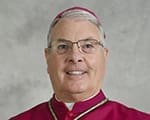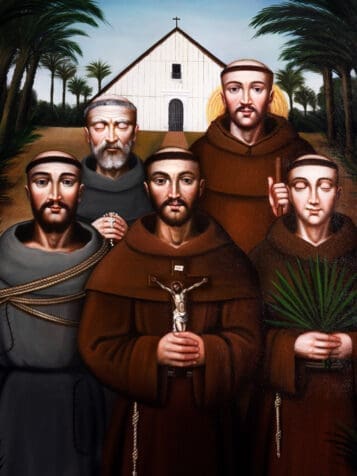 Archbishop Gregory J. Hartmayer, OFM Conv., is the seventh Archbishop of Atlanta. In his award-winning column “Peace and All Good,” he shares homilies and pastoral reflections.
Archbishop Gregory J. Hartmayer, OFM Conv., is the seventh Archbishop of Atlanta. In his award-winning column “Peace and All Good,” he shares homilies and pastoral reflections.The blood of martyrs is the seed of the church
By ARCHBISHOP GREGORY J. HARTMAYER, OFM Conv. | Published July 6, 2023 | En Español
The liturgical calendar of the summer months includes the feasts of many martyrs—those who died for their faith. For example, we honor St. Thomas More and St. John Fisher, on June 22, who died for refusing to take the Oath of Supremacy that made King Henry VIII the supreme head of the church in England.
St. Peter, the Apostle to the Jews, and St. Paul, Apostle to the Gentiles, are celebrated on June 29, followed by the First Martyrs of Rome on June 30. August 14 is the feast of a fellow Conventual Franciscan, St. Maximillian Kolbe, who took the place of a condemned man in the Auschwitz concentration camp.
An early Christian author wrote: “The blood of the martyrs is the seed of the Church.” It is in these places that the faith thrives. The blood of the martyrs was also poured out here in Georgia. A Spanish expedition established St. Augustine (Florida) in 1565 making it the first city in the United States. It did not take the Franciscan missionaries much time to travel up the Georgia coast and establish missions in St. Simon’s Island, St. Catherine’s Island and Jekyll Island. These missions were in the territory of the Guale Native Americans.
At first, there was a peaceful existence between the missionaries and the natives. Many were baptized into the Christian faith. However, the harmony that had existed ended abruptly in the summer of 1597 when one of the young chieftains, Juanillo, who was baptized into the faith, took a second wife.
One of the friars, Father Pedro de Corpa rebuked Juanillo’s action of polygamy as being contrary to the Christian faith. A revolt ensued which led to the death of Father de Corpa, and four other Franciscans, Blas Rodriguez, Antonio de Badajoz, Fray Miguel de Anon and Francisco de Verascola. A sixth friar, Father Francisco de Avila was tortured, but was later released after negotiations by a Spanish officer from St. Augustine.
Father de Avila attested to the fidelity and courage of his brother Franciscans in the face of imminent death. The Franciscan Martyrs of Georgia died in defense of the sanctity of marriage. The beatification process for the Franciscan Martyrs of Georgia began in the Diocese of Savannah in 1984 and transferred to Rome in 2007.

A painting depicting the Georgia Martyrs at St. Francis of Assisi Church in Cartersville. Photo by Johnathon Kelso
At that time, I issued a letter and stated: “As a Franciscan Bishop, I especially feel determined to contribute to the public recognition by the Church of the price of discipleship in boldly preaching and witnessing the teachings of the Church. Friar Pedro de Corpa and Companions are our spiritual ancestors in South Georgia, a local church that is rich in diversity and history. May they pray for us and our intentions and may their ultimate sacrifice in the name of Christ be officially recognized by the Church.”
Martyrs give supreme witness
Martyrs are not a vestige of the past; rather we have many modern-day martyrs. This past May, Pope Francis presided at a general audience in St. Peter’s Square, where he was joined by Pope Tawadros II of the Coptic Orthodox Church. The Holy Father announced that 21 Coptic Orthodox martyrs will be inserted into the Roman Martyrology of the Catholic Church as a sign of the spiritual communion of the two Christian Churches. The Coptic Christians were beheaded in Libya in 2015 by militants of the so-called Islamic State. A video of the executions was posted online sending shockwaves throughout the world.
Would you be willing to die for your faith? It is a question that arises in our minds and hearts as we reflect on the martyrs of every time and place. The word “martyr” means witness. The Catechism of the Catholic Church (no. 2473) says that “martyrdom is the supreme witness given to the truth of the faith: it means bearing witness even unto death.”
At a prayer service in Rome commemorating modern-day martyrs, Pope Francis said: “A martyr can be thought of as a hero, but the fundamental thing about a martyr is that he or she was ‘graced’: it is the grace of God, not courage, that makes us martyrs. Today, in the same way one could ask: ‘What does the Church need today?’ Martyrs, witnesses, namely, everyday saints. Because the Church is led forward by saints. Saints: without them, the Church can no longer go forth. The Church needs everyday saints, those of ordinary life carried out with coherence; but she also needs those who have the courage to accept the grace to be witnesses to the end, unto death. All those are the living blood of the Church. They are the witnesses who lead the Church forward; those who attest that Jesus is Risen, that Jesus lives, and affirm it with coherence of life and with the strength of the Holy Spirit which they have been given.”
While you and I may never have to give our lives for our faith, we have many opportunities to serve as witnesses by standing up for our faith.
We see in our own country how our Catholic faith is ridiculed in the public square, be it in politics or sports or entertainment! Do we remain silent in the face of such attacks? Or do we have the courage to respond, with charity and sincerity?
Our faith is the pearl of great price, a treasure beyond compare. May our lives be a witness to this truth. And may the martyrs of every time and place inspire us and intercede for us as we live out our faith. May the Lord grant you his peace!
To learn more about the Georgia Martyrs, visit https://thegeorgiamartyrs.org. A video about the friars may be viewed at tinyurl.com/2buuu4wb.